Why Lesbian Day of Visibility matters
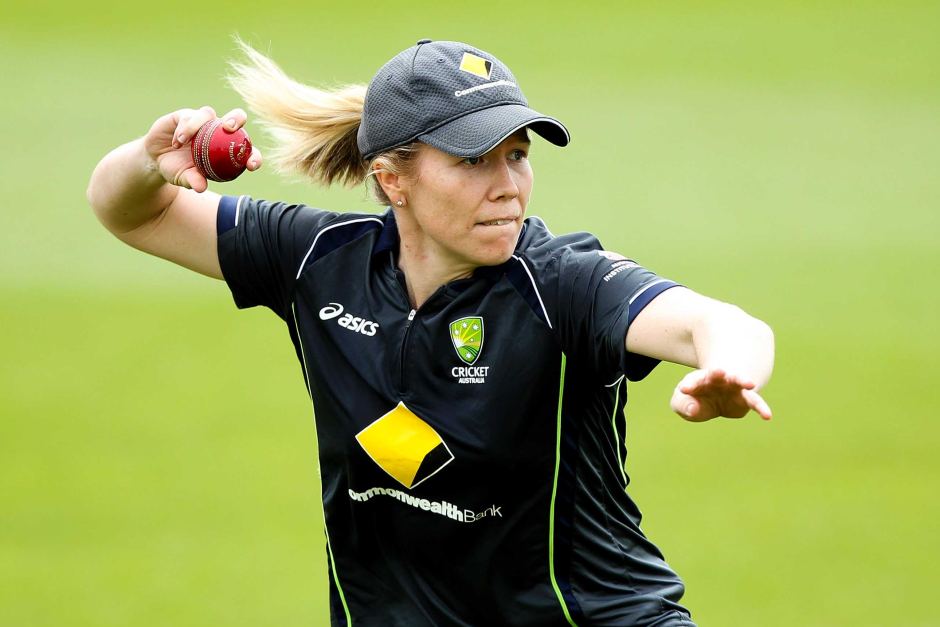
“Lesbian Day of Visibility… gives a platform to strong lesbian role models, whose stories make us all feel visible too. That’s why this day matters” – Jessica Borham, Stonewall’s Head of Supporter Fundraising
April 26 is Lesbian Day of Visibility – an LGBT+ awareness day (of which there are several in the calendar). You can find related conversations and content on Twitter using the hashtags #LesbianDayOfVisibility, #LDOV and #LesbianVisibilityDay.
In an AfterEllen.com article from last year, writer Lily Khuu places the awareness day’s origins in 2008, which would make this the 11th LDOV. As for the reasons why it falls on April 26, there doesn’t seem to be a consensus. But what is in no doubt is the importance of having such a day. As Jessica Borham suggests in the above quote from her Stonewall blog 12 months ago, there are very few stories about lesbians being told or heard on the other 364 days of the year. April 26 marks a chance to share some and have them seen more widely; here’s Stonewall CEO Ruth Hunt on the “fleeting” visibility of lesbians in the media, and why it’s important to reach out to all the women who are gay in your community…
In our twin worlds of sports and sports media, there should be an even greater desire to do so. In sports, lingering stereotypes and the problems which arise from pigeonholing tend to keep the volume turned down on lesbian voices, while in sports media, it’s still a male-dominated industry. As data collated by BCOMS in 2016 showed, only 12 out of 143 newspaper roles at that summer’s big four sporting events (Olympics, Paralympics, Euro 2016 and Wimbledon) were filled by women.
To mark Lesbian Day of Visibility 2018, Sports Media LGBT+ has collated a series of seven stories and quotes from lesbian role models in sport and the media – all published in the last year – where they talk about their experiences, their working environments, and why being out and showing diversity are so important…
‘They thanked me for making myself visible’
Casey Stoney MBE is the assistant manager and former captain of the England Women’s football team, with whom she won 130 international caps as a defender. In an interview with Sky Sports for the ‘My Icon: Rainbow Laces’ series in November 2017, she described the reaction to her coming out story in 2014…
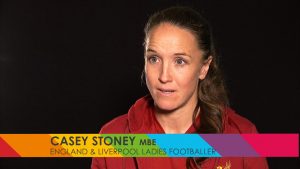
“The reaction was overwhelmingly positive. The amount of people that reached out to me… to thank me, which I didn’t understand at the time. They thanked me for making myself visible, which normalised it a little bit for them, made their lives a little bit easier. The amount of letters I got… actually, one of the key things was a parent reached out to me to say ‘thank you’, because of what I’d done. Two days before, her daughter had gone and spoken to her. That was a part of her life that her daughter was hiding from her. So that was really really positive.”
‘We’re happy together, and we want to show that’
Alison van Uytvanck has risen into the top 50 of the WTA rankings this year, following victories at recent tournaments in Quebec and Budapest. In March, she spoke to Sporza in her homeland of Belgium about being bullied at school, how her success is the best response, and her relationship with fellow tennis player Greet Minnen…
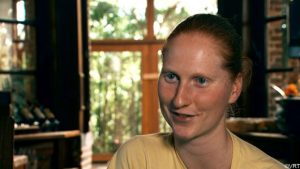
“I proved to the bullies that I can do it… They will now see me and that will hurt them. Even as an 11-year-old, stand up for yourself. If you don’t do that, you creep into a corner and screen yourself off. It’s difficult to see something positive in yourself, but it also made me strong. Now when I meet and work with children myself, I say: ‘No bullying here!’
“I’ve become happier. [Greet] and I will soon be living together. We feel very good and are very happy together. We want to show that to the outside world. Nobody has to justify why he or she is gay or lesbian. It’s not a disease. We don’t hide it, and we’re accepted. That gives us a good feeling.”
‘I’m just gonna be me’
Caster Semenya is a two-time Olympic gold-medal winning 800m runner. In July 2017, she spoke to the rapper ProVerb in a wide-ranging interview for BET – part of which also ran on YouTube in a sponsored series – about her career and achievements, and also her marriage earlier that year to Violet Raseboya. For Semenya, visibility as a lesbian is part of her identity…
“It’s something I felt from young. I always felt a bit different. When I’m with boys, I feel comfortable. When I’m with girls, I catch feelings. It’s not anything I can control. Today, I’m a powerhouse. They know I’m lesbian. They build you, even if they think they are destroying you.
“I know how I look like. I know how I sound. I know how I walk. I walk the talk. I’m a woman of my actions. I’m just gonna be me. I do me and you do you.”
‘I couldn’t name someone out and successful’
Kate Scott is a play-by-play (PBP) broadcaster, reporter and host for the Pac-12 Network in the US and also commentates for NBC Sports Bay Area and NBC Sports California. Last summer, she told a Sports Illustrated media round-table of fellow LGBT+ journalists about a pledge she made to herself after coming out to her mother…
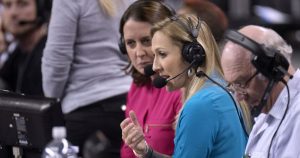
“I’ll never forget what my mom said to me when I first told her that I was gay. We were sitting on the rocks, along the shoreline on the south end of Sausalito’s main drag. I was just a few weeks from finishing my junior year at Cal. As I told her, she started to cry. At first, I thought it was because she was disappointed in me, she didn’t approve, something like that, so I asked, “Mom, what’s wrong?” She looked at me and said, “Oh Kate, I’m just so scared. You’ve already worked so hard as a woman to get your foot in the door in sports, and now you’re going to have to deal with this too? I’m just scared that you’ll never get a fair shot. I mean, name one gay broadcaster.” I paused and thought for a moment.
“Well mom, I know there’s plenty of gay people in broadcasting… ”
“Yeah, but name one person who’s out. And successful.”
“And at the time, I couldn’t. I made the decision then and there that if I ever got to a place where I felt comfortable in my career being out, I would, because if I could alter that conversation for even one parent and their child, anything I’d have to deal with for being truthful about who I am would be worth it.”
‘Our representation is often so tokenistic’
Claudia Carvell is the women’s programme co-ordinator at the LGBT Foundation, based in Manchester. In December 2017, she spoke to MarketingWeek.com’s Leonie Roderick for an article entitled ‘Why are advertisers still failing to represent lesbians?‘ The article noted research conducted by Lloyds Banking Group in 2016 which showed 79% of all consumers surveyed felt lesbians were under-represented in advertising. Only 21% of lesbians taking part in the research felt advertising reflects their lives. Carvell was unsurprised by the figures…

“[Advertising] simply isn’t for me as a gay woman. I feel it’s not relevant to me because our representation is often so tokenistic, there is no way they represent the whole community because you only see one type.
“Often women are just presented to satisfy the male gaze – which reflects the maleness of the advertising industry I suppose. The problem is that so few ads feature gay women, so it will feel tokenistic until this changes.”
‘People avoided being themselves. Even I did’
Alex Blackwell is a professional cricketer who has won over 250 international caps across Test matches and one-day games for Australia. In March, she spoke to The Australian’s Gideon Haigh about the lack of lesbian visibility in women’s cricket, her own role in that, and how the support for inclusion provided by Cricket Australia has been welcome, even if it is tentative…
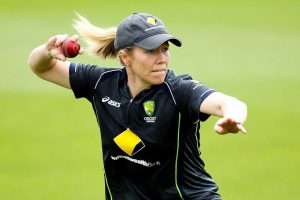
“It’s been strange for me, because we’re not silent within our families or within our teams. It’s open, it’s normal, sexuality is not a big deal, and it’s certainly not the most important thing about our athletes. But there was this silence outside the teams. People avoided being themselves. Even I did. I noticed I wasn’t freely giving my story.
“You don’t need to fear out athletes. There are out people everywhere. And I sense that while cricket has done a few things to show that they are on a journey to inclusion, like supporting marriage equality, it’s a bit like they popped it out there and closed their eyes. When they [Cricket Australia] got quite a bit of abuse online about their stance on same-sex marriage, they didn’t respond.”
‘Short hair, muscly… who cares?’
Kate Richardson-Walsh OBE was captain of both the England and Great Britain hockey teams for 13 years, and won gold at the Rio Olympics in 2016 in a GB team which also featured her wife Helen. In an edition of the Homo Sapiens podcast earlier this month, Kate described her initial reaction to an image of herself celebrating on the hockey pitch, and why that was a cause for frustration…
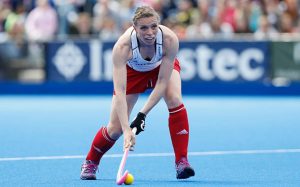
“We hate traditional gender stereotyping, and pigeonholing… in terms of how you’re viewed. I cut my hair – I change my hair all the time, I’ve had every colour under the sun, it’s been long, short, everything. I went really short, it was shaved in at the back and quite short on top. I remember one of the pictures – we went to a tournament in Argentina, and the team or I had just scored, and I was really pumped up. I was angry faced, and all my muscles were showing. I remember seeing a picture afterwards, and I was like ‘hmm’. And then I hated myself for it. Just because you’ve got short hair and you’re muscly, who gives a shit? It’s got nothing to do with your sexuality. It’s just Kate, who cares? But I was annoyed with myself for having that bloody thought.”
Share the stories that have inspired you in the Comments section below. Connect with us on info@sportsmedialgbt.com to learn more about our work as an LGBT+ network for the sports media industry.


